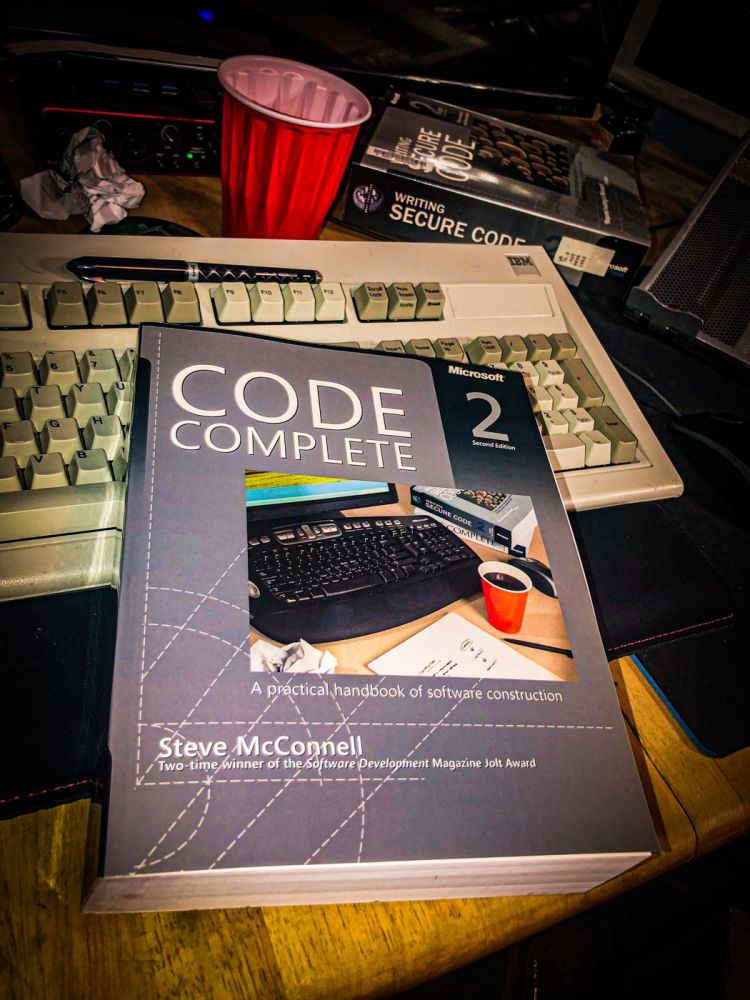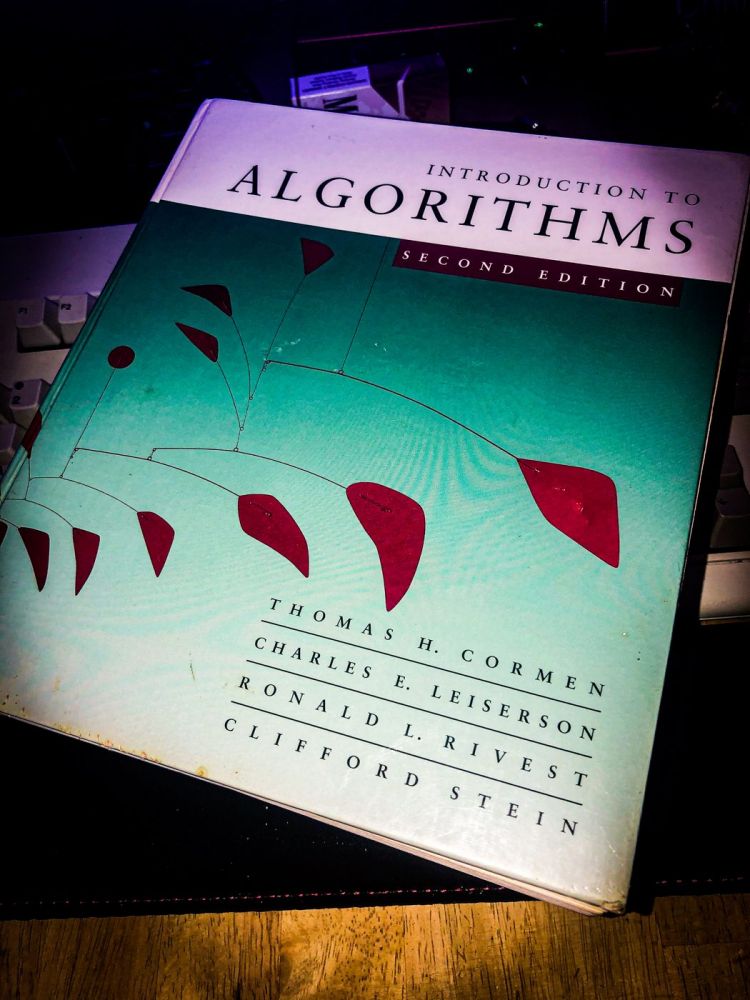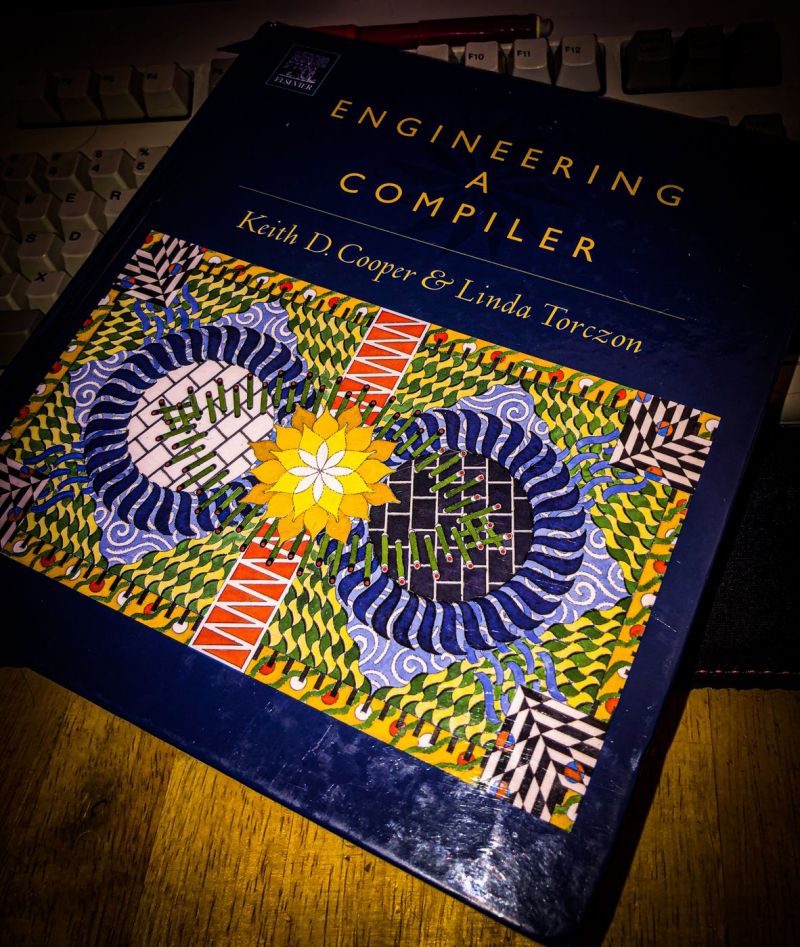Join devRant
Do all the things like
++ or -- rants, post your own rants, comment on others' rants and build your customized dev avatar
Sign Up
Pipeless API

From the creators of devRant, Pipeless lets you power real-time personalized recommendations and activity feeds using a simple API
Learn More
Search - "book covers"
-
All O RLY book covers. I laughed so hard that my head is blowing right now :D
https://github.com/thepracticaldev/... 3
3 -
Hi, rant. I've just finished one of my hobby work. :D
Just another O'RLY book cover generator, written in Golang/Vue, supporting more glyph like CJK.
You may try it on https://rly.nanmu.me/
Source code is available via MIT license on https://github.com/nanmu42/orly
Cheers. :) 10
10 -
Been really busy with things haven’t got around to posting a book in like a week or so..
But I’ll post one today..
This book...
This book, available for free online or you can buy it, written in 1994. But so under appreciated by people for some reason most people never have seen it or know about it. But this is the ONLY book I know of that actually covers this topic.. the only book in existence that specifically goes thru how OOP can be done with C.
NOW hold up before you say just use C++ stop and think for a second.. bear with me.
First off this book is purely for informational purposes and educational use to deepen your understanding of what OOP is actually doing behind the scenes in languages like C++ where keywords exist for these things and you just blindly use them without thinking about under the hood.
This book contains a lot of code and builds you up a complexly library from scratch to make OOP in C... now I don’t take this book literally and this but I have implemented some concepts from this book in projects in the past, and it helps a lot.
Also in my honest opinion If you finish this book, you will be a better C programmer AND c++ programmer, C programming because it teaches you a lot about complex things that you never thought about doing with the language. It proves you can do polymorphism can do inheritance and encapsulation. And it’s not really bloated either.
This books is an awesome book, if you don’t understand C pointers you definitely will after this book.. if you don’t understand OOP in C++ what’s really going on.. you will after this book. After all C++ began as just a preprocessor of C.
Great book for writing reusable, extendable large scale embedded c systems.
Anyway.. rare book of which should not be rare considering it’s free. 3
3 -
Life Hack: don't use alcohol or chemicals, rub off glue residue easily with olive oil / baby oil
Works like a charm and also doesn't break cardboard videogame boxes/ book covers 9
9 -
Probably the MOST complete software book on a very broad subject.
This is book to read for those of you are near college grad, first job in the industry. But to the level of detail and broad coverage this book has I think it’s actually a great book for everyone in the industry almost as a “baseline”
From requirements, project planning, workflow paradigms. Software Architecture design, variable naming, refactoring, testing, releasing the book covers everything, not only high level but also in reference to C.
Why C ...because in the consumer electronics, automotive industry, medical electronics and other industries creating physical products c is the language of choice, no changing that. BUT it’s not a C book... it contains C and goes into dept into C but it’s not a C book, C is more like a vehicle for the book, because there are long established, successful industry’s built around it. Plenty of examples.
When I say it’s the most complete on a broad subject seriously like example the chapter about the C language is not a brief over like many other books, for example 10 pages alone are dedicated to just pointer! Many C books have only a few paragraphs on the subject. This goes on depth.
Other topics, recursion, how to write documentation for your code.
Lots of detail and philosophy of the construction of software.
Even if you are a veteran software engineer you could probably learn a thing or two from the book.
It’s not book that you can finish in weekend, unless you can read and comprehend over 1000 pages.
Very few books cover such a broad topic ALL while still going into great detail on those subtopics. the second part is what lacks in most “broad topic books” ..
Code Complete.. is definitely “Complete”
So the image doesn’t match the rest of my book images because I tried to make an amage to cover of the book, inception style kinda haha 😂 19
19 -
If there is 2 books you should read before trying to tackle TAOCP... this might be on it.. as well as the Concrete Mathematics book.
Anyway. This book covers not just the fundamentals of modern algorithms and data structures but it also makes the leap to understanding multithreading and algorithms using multithreading.
Some argue the certain concepts in this book are presented without explanation of how they work, but I guess that should be something the reader try’s to figure out from another book or constructive thinking critically. Keeps the reader on their toes for understanding.
This is also the reason many people suggest the sedgewick algorithm books, of which will be posted another day. 16
16 -
I’m slacking been so busy, forgot to post yet another book..
Soo here ya go..Engineering A Compiler.
For those who don’t like the Red Dragon compiler book for whatever reason, most don’t like it because they don’t believe the dragon book covers topics in a “Teachy way” and doesn’t explain certain things. As well as not cover one topic.
Then this may be the book for you. It’s significantly newer than the “Dragon book” and I believe it does do a better job laying out for “learning”.. I could see this book being used in universities.. I’m sure it is, but mine never had a compiler course so whatever. Good book
Fun fact.. it references the dragon book, as well as the other books the dragon book authors wrote as well as articles in the ACM..AND! It also references Knuths art of computer programming and other books of knuth AND references the Algorithms book. All books I have previously posted.
I have not read this book, only skimmed as I have recently received it this one. May do a follow up or even at it to the list to make a YouTube playlist going chapter by chapter thru the book. 8
8 -
Question - is this meaningful or is this retarded?
if
2*3 = 6
2*2 = 4
2*1 = 2
2*0 = 0
2*-1 = -2
then why doesnt this work?
6/3 = 2
6/2 = 3
6/1 = 6
6/0 = 0
6/-1 = -6
if n/0 is forbidden and 1/n returns the inverse of n, why shouldn't zero be its own inverse?
If we're talking "0" as in an infinitely precise definition of zero, then 1/n (where n is arbitrarily close to 0), then the result is an arbitrarily large answer, close to infinite, because any floating point number beneath zero (like an infinitely precise approximation of zero) when inverted, produces a number equal to or greater than 1.
If the multiplicative identity, 1, covers the entire set of integers, then why shouldn't division by zero be the inverse of the multiplicative identity, excluding the entire set? It ONLY returns 0, while anything n*1 ONLY returns n.
This puts even the multiplicative identity in the set covered by its inverse.
Ergo, division by zero produces either 0 or infinity. When theres an infinity in an formula, it sometimes indicates theres been
some misunderstanding or the system isn't fully understood. The simpler approach here would be to say therefore the answer is
not infinity, but zero. Now 'simpler' doesn't always mean "correct", only more elegant.
But if we represent the result of a division as BOTH an integer and mantissa
component, e.x
1.234567 or 0.1234567,
i.e. a float, we can say the integer component is the quotient, and the mantissa
is the remainder.
Logically it makes sense then that division by zero is equivalent to taking the numerator, and leaving it "undistributed".
I.e. shunting it to the remainder, and leaving the quotient as zero.
If we treat this as equivalent of an inversion, we can effectively represent the quotient from denominators of n/0 as 1/n
Meaning even 1/0 has a representation, it just happens to be 0.000...
Therefore
(n * (n/0)) = 1
the multiplicative identity
because
(n* (n/0)) == (n * ( 1/n ))
People who math. Is this a yea or nay in your book?14 -
Just bought a book that covers some techs that I use, but want to get better at. I get less than a chapter in, and realize something is horribly wrong. I check the publication date. 2015.
I am so fucking stupid.3 -
Rant portion:
Fuck me, there's not a ton of great resources for Lua. I have the book, and it's actually fucking incredible, but as soon as I have a question which I would usually Google, either it's a SO question that almost hits the mark (but absolutely does not answer my initial question) or a mailing list that DOES answer my question but holy FUCK it's difficult to read!
I 100% recommend the Lua book, though. It's remarkably helpful and covers just about every little detail of the language and it's corresponding c API, and even some of how Lua works behind the scenes.
Non-rant portion:
Finished up the first version of my library and now I'm binding it to Lua and this time around I'm using all the best practices including setting and checking metatables so that Lua can't segfault. It's going great, I properly learned about the Lua stack, and I feel good. Cross-platform double-buffered command line via a scripting language... What a way to enter 2020. Everything went so smooth that I got to 3am before I realized what even happened.1 -
NO FUCKING WONDER I SUCKED-ASS IN HIGH SCHOOL ALGEBRA!!!!!
Arghgghhghgh ughhh....
I want to beef up the hell out of my Maths Chops so I can maybe try going back to school for a A.S. in EE or hell even an B.S.
I'm using my company's Safari Learning account for getting free-ish access to college algebra books and I'm self studying.
I'm still in Chapter 0 where the book covers shit you're supposed to know from previous years of education. I'm just learning about some of this shit now!!!
While it's possible that I didn't pay attention in high school lectures, I took geometry in 9th grade and was an A/B+ student and felt confident in maths. I got to Algebra II in High School and suddenly nothing made sense anymore, reality fucking-fell-apart!
Suddenly, I'm failing tests left and right and struggling with the lecture concepts and I could never seem to grasp materials covered in class anymore to even be able to finish the homework assignments.
Fast forward to me being 15 years older and wanting to take a stab at this shit again, but with new found determination to get into EE so I can fuck around with small electronics for pet projects I want to do. I'm starting with College Algebra to try and learn when suddenly, low and behold I have a HUGE FUCK-MOTHERING GAP in my core understanding of the language/syntax/grammar of mathematics.
Been fucking knee-capped for the last decade+ because I either slacked off during those fundamental lectures (which again; is totally plausible) or I had a complete fucking imbecile for a math teacher that glossed over the topics and fucked not only me but the 40+ other kids in that class.
I'm not going to blame the teacher, although I really fucking want to, but I can't remember how the class scored on tests or homework to be able to fairly and objectively make that judgement against the educator.
FUCK!!! I hate my 15 y.o. self right now6 -
Wasting an hour reading a book with the wrong title today.
What if we brought back judging books by their covers?2 -
Rank Business Institute – Enroll in the Best Digital Marketing Course in Navi Mumbai
In an age where everything is going digital, the demand for skilled digital marketers is skyrocketing. Whether you're looking to boost your career, start your own business, or gain a competitive edge in today’s digital-first world, the right training can make all the difference. That’s where Rank Business Institute comes in.
Your Destination for a Career-Defining Digital Marketing Course
Located at First Floor, Haware Fantasia Business Park Corporate wing, F-188, Sector 30A, Vashi, Navi Mumbai, Maharashtra 400705, Rank Business Institute offers a practical and industry-relevant Digital Marketing course that prepares you for real-world challenges.
What Makes Our Digital Marketing Course Stand Out?
At Rank Business Institute, our Digital Marketing course is designed by industry experts with years of hands-on experience. The curriculum covers every essential aspect of digital marketing, including:
Search Engine Optimization (SEO)
Google Ads & Pay-Per-Click Advertising (PPC)
Social Media Marketing (SMM)
Email Campaign Strategies
Content Creation & Marketing
Web Analytics & Conversion Optimization
Affiliate and Influencer Marketing
E-commerce & Online Branding
Who Is This Course For?
Our Digital Marketing course is perfect for:
Students and fresh graduates looking to enter the marketing field
Working professionals aiming to upskill or change careers
Entrepreneurs and small business owners wanting to grow their brand online
Freelancers looking to offer digital marketing services
We offer flexible batches (weekday and weekend options), personalized mentorship, and hands-on projects to ensure our students gain not just knowledge, but confidence.
Connect With Us
Ready to take the next big step in your career? Call Rank Business Institute today at 09082234835 to book your seat or schedule a free consultation.
Rank Business Institute – Your trusted partner for a future-ready Digital Marketing course in Navi Mumbai.2 -
A1 Auto Spa: Your Top Choice for Car Detailing Near Me in Brampton
At A1 Auto Spa we understand the search for “car detailing near me” means you want convenient, professional service close to home. Located on Parity Rd, Brampton, ON L6X 5M5, Canada, our facility offers comprehensive car detailing solutions designed to restore your vehicle’s appearance, protect its finish, and exceed your expectations—all within minutes of your neighborhood.
Complete Exterior and Interior Detailing
Our car detailing near me services include a full suite of exterior and interior treatments tailored to your needs. Exterior detailing begins with a hand wash and decontamination using pH-balanced shampoos and clay-bar treatment to remove pollutants. Paint correction and polishing eliminate swirl marks and light scratches before applying a protective wax or sealant. Wheels and tires receive specialized cleaners and dressings to enhance curb appeal. Interior detailing covers vacuuming, steam extraction, and fabric shampooing to remove dirt, stains, and allergens. Leather surfaces are cleaned and conditioned, and dashboards, consoles, and trim are treated with UV-resistant protectants. Every service is performed by certified technicians following a multi-step protocol for consistent, high-quality results.
Mobile and On-Site Convenience
Searching for “car detailing near me” often means you need flexibility in location and timing. A1 Auto Spa offers both in-shop and mobile car detailing near me options. Our fully equipped service vans travel throughout Brampton to deliver the same premium detailing packages at your home or workplace. All water, power, and eco-friendly products are carried on board, ensuring no compromise in quality or environmental responsibility.
Transparent Pricing and Custom Packages
We know that finding “car detailing near me” should not mean hidden fees or surprises. A1 Auto Spa provides clear, competitive pricing and customizable packages. Choose from individual services—such as exterior wash, interior deep clean, paint correction, or ceramic coating—or select a complete detail package for full interior and exterior rejuvenation. Our staff will explain each option and recommend the ideal combination to fit your budget and vehicle condition.
Local Expertise and Quality Assurance
When you search “car detailing near me” you deserve a team that knows Brampton roads, weather, and environmental factors. Our technicians understand local conditions—from winter road salt to summer pollen—and select products and methods optimized for lasting protection. Every detail job undergoes a 20-point quality inspection to ensure polish, clarity, and cleanliness meet our rigorous standards.
Why Choose A1 Auto Spa
Local Convenience and Reliability
Our Brampton facility and mobile service vans make “car detailing near me” a seamless experience.
Certified Technicians and Premium Products
We use industry-leading tools, eco-friendly cleaners, and advanced coatings for salon-quality results.
Customized Detailing Packages
Pick only the services you need or choose a comprehensive package for full restoration and protection.
Eco-Responsible Practices
Biodegradable solutions and water-efficient techniques demonstrate our commitment to the environment.
100% Satisfaction Guarantee
If any aspect of your detail does not meet your expectations, we’ll return at no extra charge to make it right.
Contact Us
To book the best “car detailing near me” experience in Brampton call A1 Auto Spa at +1 249-594-1313 or visit us at Parity Rd, Brampton, ON L6X 5M5, Canada. Our team will help you select the perfect detailing package and schedule a convenient appointment—whether at our shop or your driveway. Trust A1 Auto Spa for professional car detailing near you that leaves your vehicle looking its absolute best.334
